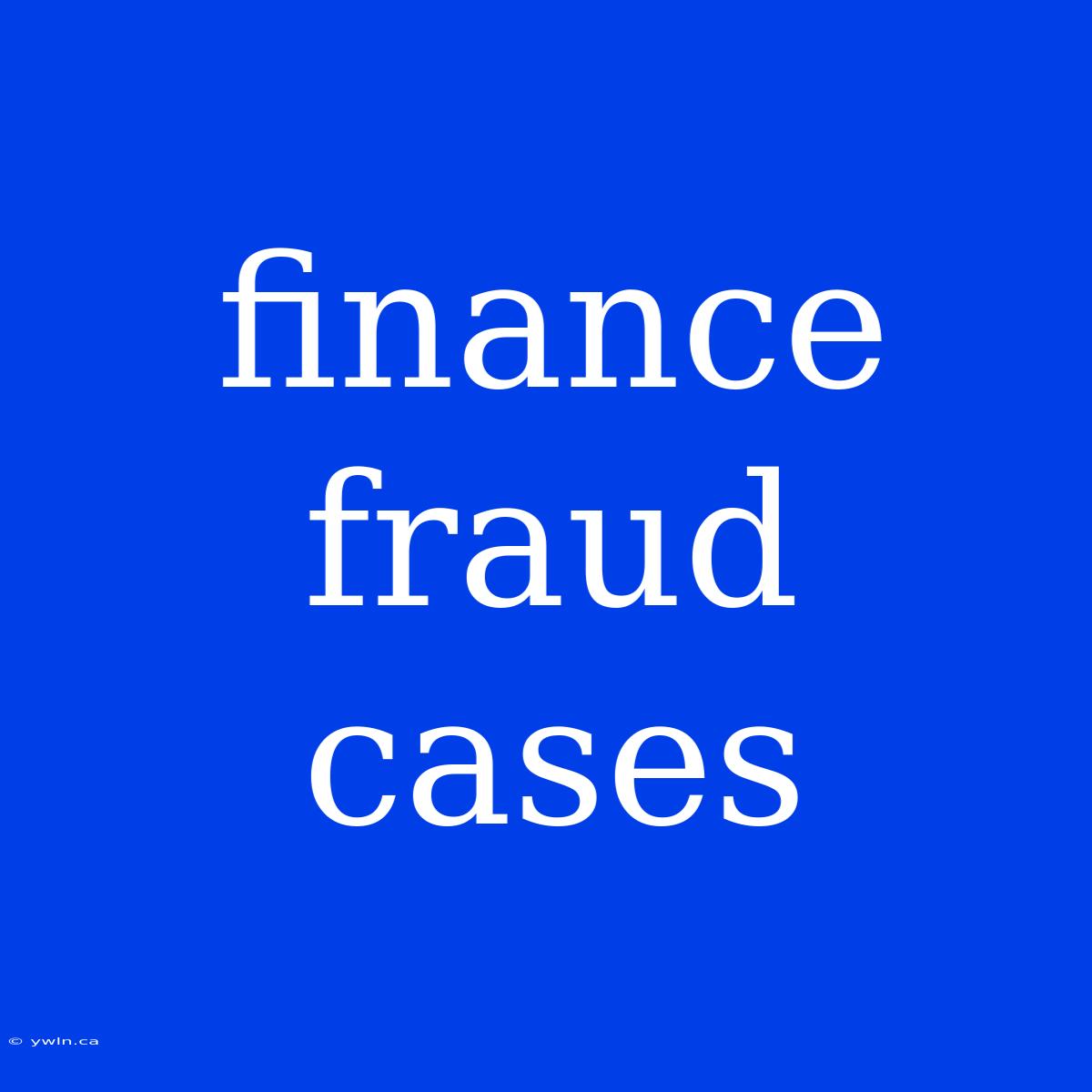Unveiling the Dark Side of Finance: Exploring High-Profile Fraud Cases and Their Implications
How do seemingly legitimate financial institutions fall prey to intricate schemes, and what can we learn from these high-profile cases? Finance fraud, a pervasive threat in today's interconnected world, often operates under the guise of sophistication and complexity. This article delves into the intricacies of finance fraud cases, examining their impact on individuals, institutions, and the global economy.
Editor Note: Finance fraud remains a pressing concern, affecting individuals, businesses, and the financial system as a whole. Understanding the tactics employed by fraudsters and the impact of their schemes is crucial for strengthening security measures and protecting financial integrity.
Analysis: This article draws upon a comprehensive analysis of high-profile finance fraud cases, including extensive research on their background, tactics employed, and ramifications. We aim to provide insights into the various facets of financial crime and equip readers with knowledge to better navigate the complexities of the financial landscape.
Key Insights:
| Aspect | Description |
|---|---|
| Types of Finance Fraud | Includes Ponzi schemes, insider trading, money laundering, identity theft, and investment scams. |
| Impact of Finance Fraud | Leads to financial losses, reputational damage, erosion of trust in the financial system, and legal consequences. |
| Prevention and Mitigation | Requires robust risk management practices, vigilant monitoring, and effective fraud detection systems. |
Finance Fraud: A Multifaceted Threat
Types of Finance Fraud: Finance fraud encompasses a wide range of illicit activities, each exploiting vulnerabilities in the financial system.
1. Ponzi Schemes: These schemes involve using new investors' funds to pay off earlier investors, creating an illusion of profitability. The Bernie Madoff case, where investors lost billions of dollars, is a prime example.
2. Insider Trading: This involves using non-public information to gain an unfair advantage in the stock market. Raj Rajaratnam, a hedge fund manager, was convicted of insider trading, highlighting the devastating impact of this crime.
3. Money Laundering: This process involves concealing the illegal origin of funds by layering them through various financial transactions. The Panama Papers scandal exposed the intricate network of offshore shell companies used for money laundering.
4. Identity Theft: Criminals use stolen personal information to obtain credit, access bank accounts, and commit other financial crimes. This type of fraud has a significant impact on individuals, leading to financial distress and damage to credit scores.
5. Investment Scams: Fraudsters deceive investors by promising unrealistic returns or guarantees. The recent rise of cryptocurrency scams underscores the importance of due diligence and awareness.
Impact of Finance Fraud: The consequences of finance fraud are far-reaching, affecting both individuals and the financial system as a whole.
1. Financial Losses: Victims suffer financial losses, ranging from minor amounts to catastrophic sums. The economic impact of fraud can be devastating for individuals and businesses.
2. Reputational Damage: Institutions involved in fraud face significant reputational damage, potentially leading to loss of public trust and customer confidence.
3. Erosion of Trust: Finance fraud undermines the integrity of the financial system, eroding public trust in financial institutions and markets.
4. Legal Consequences: Perpetrators of finance fraud face severe legal consequences, including imprisonment and hefty fines.
Prevention and Mitigation: While finance fraud is a complex challenge, effective strategies can mitigate its impact and protect individuals and institutions.
1. Robust Risk Management Practices: Financial institutions should implement robust risk management practices, including thorough due diligence, KYC (Know Your Customer) procedures, and transaction monitoring.
2. Vigilant Monitoring: Continuous monitoring of accounts, transactions, and market trends is essential to detect suspicious activities.
3. Effective Fraud Detection Systems: Institutions should invest in sophisticated fraud detection systems, incorporating AI and machine learning to identify patterns and anomalies.
4. Public Education: Raising public awareness about finance fraud is crucial. Individuals need to be educated about common scams, best practices for protecting their information, and reporting suspicious activities.
In conclusion, finance fraud remains a serious threat to the global financial system. Understanding the diverse types of fraud, their impact, and the tools available for prevention is paramount in safeguarding financial integrity and protecting individuals from exploitation. By implementing robust security measures, promoting public awareness, and fostering international collaboration, we can collectively combat finance fraud and build a more resilient financial landscape.

